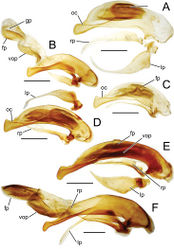Mecyclothorax fosbergioides
| Notice: | This page is derived from the original publication listed below, whose author(s) should always be credited. Further contributors may edit and improve the content of this page and, consequently, need to be credited as well (see page history). Any assessment of factual correctness requires a careful review of the original article as well as of subsequent contributions.
If you are uncertain whether your planned contribution is correct or not, we suggest that you use the associated discussion page instead of editing the page directly. This page should be cited as follows (rationale):
Citation formats to copy and paste
BibTeX: @article{Liebherr2013ZooKeys322, RIS/ Endnote: TY - JOUR Wikipedia/ Citizendium: <ref name="Liebherr2013ZooKeys322">{{Citation See also the citation download page at the journal. |
Ordo: Coleoptera
Familia: Carabidae
Genus: Mecyclothorax
Name
Mecyclothorax fosbergioides Perrault, 1988: 232 – Wikispecies link – Pensoft Profile
Identification
The largest bodied Tahitian Mecyclothorax at standardized body length 8.6–8.9 mm, and sharing the lanky proportions of its group mate, Mecyclothorax fosbergi (Fig. 15). However this species is characterized by a broader pronotum, MPW/PL = 1.18, and relatively narrower humeri, MEW/HuW = 2.52, with the elytra more broadly obovate in shape. The head bears shallow isodiametric sculpticells, and the pronotum is covered by a shallow elongate transverse mesh that produces an indistinct iridescence. The discal elytral intervals are covered with a dense, regular mesh, a mixture of isodiametric and transverse sculpticells, the latter twice as broad as long. The male aedeagal median lobe – first reported here – is very similar to that of Mecyclothorax fosbergi (Fig. 13E), although the shaft is somewhat broader (Fig. 13F). Also, the apex is much more elongate and narrower dorsoventrally, though a downturned tip and flattened apical face are shared. The internal sac bears a moderately long flagellar plate, length 0.48× distance from parameral articulations to apical face. Setal formula 2202.
Distribution and habitat
The holotype female was collected by J. Gourvès at 1900 m elevation on Mont Aorai, whereas the male first reported above was collected by E.M. Claridge at 2070 m on Pito Hiti (EMEC). These two localities are an estimated 5.5 km apart taking the ridge distance between them. The microsculpture of the male is somewhat less developed than that of the female holotype. For the present the two specimens are considered conspecific, with the discovery of a male specimen from Mont Aorai the best arbiter for establishing the conspecificity or distinctiveness of the Aorai and Pito Hiti populations.
Taxon Treatment
- Liebherr, J; 2013: The Mecyclothorax beetles (Coleoptera, Carabidae, Moriomorphini) of Tahiti, Society Islands ZooKeys, 322: 1-170. doi
Images
|

